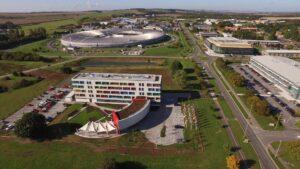The U.K. Space Agency has released the second half of its latest call for proposals for NewSpace technology research and development projects that are intended to make Great Britain “one of the world’s most innovative and attractive space economies.”

Accepted proposals will become part of the National Space Innovation Program (NSIP).
“We’re looking for technologies which have the potential to be either disruptive to the space industry or have a high commercial impact, ultimately supporting the growth of the space industry in the UK through catalyzing investment,” a U.K. Space Agency spokesperson told Connectivity Business News.
The initiative aims to distribute 64 million pounds ($78.1 million) across high-risk, high-reward projects by British organizations aiming to accelerate the development of space technology and satellite applications. Requests are due by Nov. 17.
The initiative proceeds from others such as the Enabling Technologies Programme which deployed grants ranging from 122.580 to 306.45 dollars per grant.
Disruptive British investment
The U.K. boasts a powerful research sector, and has a long history in tech sectors, but some say is in danger of falling short of European neighbors when it comes to space. John Hanley, chair of UKspace, the official trade association of the UK space industry, suggested that the U.K. is one of the most research-intensive nations in the space economy as part of a government statement.
This advantage has been boosted by the U.K.’s September rejoining of Horizon, a $100.6 billion European Union research program that prioritizes space technologies. The U.K. had lost access to in the 2020 Trade and Cooperation Agreement with Brexit.

“The U.K. has a really strong research base in the space sector. Joining Horizon will not only bring U.K.-based researchers access to further funding, but also, crucially, access to the external networks and expertise that will act to compound that research base and help accelerate our technology development,” Lewis D’Ambra, head of government and regulatory affairs at Space Forge, told CBN.
Space Forge is a space manufacturing startup, funded in part through the U.K.’s Enabling Technologies Program, which U.K. Space Agency calls a precursor to NSIP.
Anthony Baker, co-founder and chief executive of SatVu, another former recipient of critical U.K. funding, agrees that the country’s grasp of space technology is in a good place.
But “where the U.K. lags is making space relevant to the public,” Baker told CBN. “Government can help be an early adopter of space-based solutions that will de-risk new products and spur wider commercial adoption.”
That can be achieved through the high-risk investments that U.K. Space Agency is seeking to accelerate, the company says.
“The nature of experimental and early-stage technology development carries inherent risk, which is balanced against the potential payoff of achieving space concepts like in orbit manufacturing,” a U.K. Space Agency spokesperson told CBN. “Developing these discrete technologies will unlock these future space concepts, which is critical to acting in space with repeatable and reliable success.”
Case studies: SatVu and Space Forge
U.K. Space Agency’s 281,973 dollars of funding for Space Forge in June this year, according to Crunchbase, has accelerated its development of its deployable and returnable solar array, expanding its range of green applications in space, U.K. Space Agency says.
“This funding will contribute to bringing all of our technology development together to provide the U.K. with an in-space manufacturing capability that will rival the best in the world.” D’Ambra said. “But the technology will also have other applications as well, such as supporting initiatives like space-based solar power.”
Meanwhile, SatVu’s Baker said U.K. Space Agency empowers early-stage companies to be taken seriously by venture capital firms. “Every pound was eventually matched multiple times by VC funding,” he said, “creating a virtuous circle of de-risking and funding.”
SatVu has not stated how much funding they have received from U.K. Space Agency, but has raised a total of 37.9 million dollars in venture capital financing since its foundation in 2016, according to Crunchbase.
U.K. Space Agency’s funding also draws attention to the U.K.’s space sector from “investors, customers and the next generation of scientists and engineers,” the group’s spokesperson told CBN.
When it comes to failure in high-risk tech ventures, the trick is containment, particularly the inevitable ones, Baker said.
“The team must be resilient, open to discuss such circumstances, and willing to quickly learn [from setbacks] and move onto the next project,” he said.
Tech funds and accelerator programs are becoming increasingly interested in serial entrepreneurs like this, who can move onto new promising projects, regardless of success or failure.









